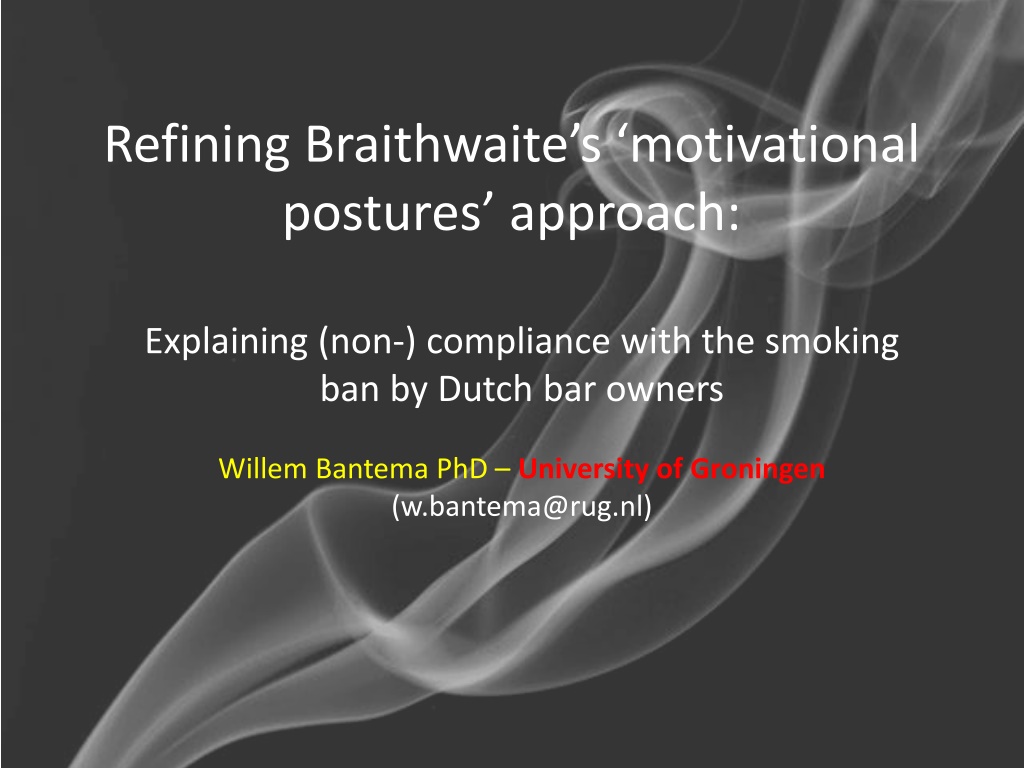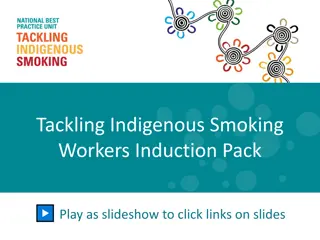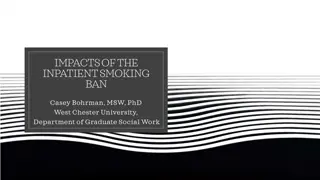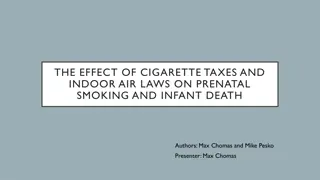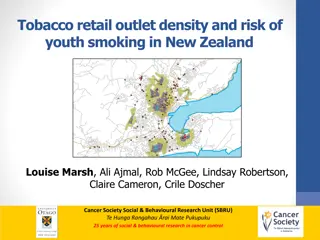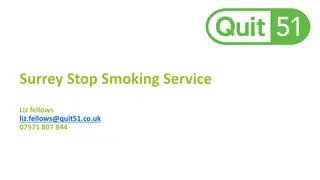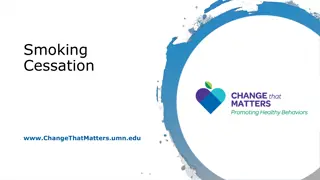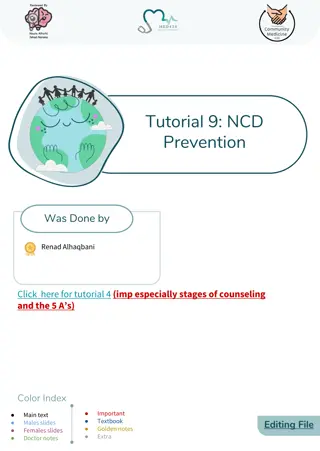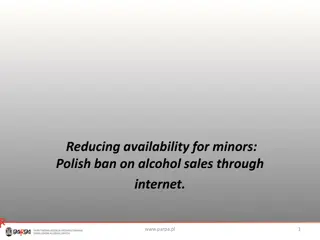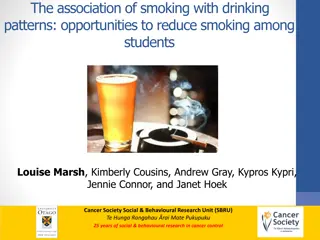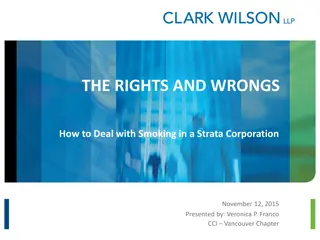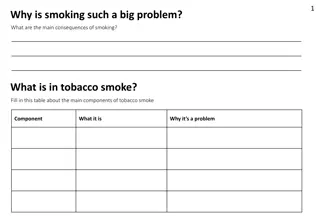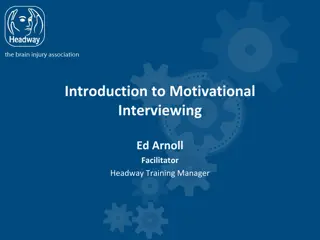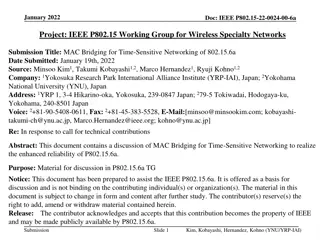Understanding Non-Compliance with Smoking Ban: A Study on Motivational Postures
Exploring the effects of motivational postures on compliance with smoking bans, this study delves into the resistance and disengagement behaviors of Dutch bar owners. The research highlights the influence of perceived enforcement and legitimacy in shaping compliance patterns among different groups, shedding light on effective regulatory strategies.
Download Presentation

Please find below an Image/Link to download the presentation.
The content on the website is provided AS IS for your information and personal use only. It may not be sold, licensed, or shared on other websites without obtaining consent from the author. Download presentation by click this link. If you encounter any issues during the download, it is possible that the publisher has removed the file from their server.
E N D
Presentation Transcript
Refining Braithwaites motivational postures approach: Explaining (non-) compliance with the smoking ban by Dutch bar owners Willem Bantema PhD University of Groningen (w.bantema@rug.nl)
Starting point Why is enforcement (procedural justice) more effective to enhance compliance for high scorers on resistance, then for high scorers on disengagement?
Outline 1. Central argument: motivational postures 2. Study design 3. Refining Braithwaite 4. Results (3 arguments) 5. Conclusion and discussion
Motivational postures - Valerie Braithwaite (1994; 1995; 2003; 2009; 2011) - What are postures? - Social distance
Study design Surveys (completed: N=620) - Self-reported compliance (scale) - Resistance and disengagement (scales) - Support for a smoking ban - Support for legislation/law in general (Tyler)
Refining Braithwaite Search for stable elements in postures (Braithwaite, 2009): human and political values. What is the role of the perceived obligation to obey the law (Legitimacy) in the relationship between these postures and compliance with the smoking ban?
Results (1) Postures and compliance Predicting (non-)compliance with postures (N=582) Model Predictor Adj. R Model 1 Resistance -.36 ** 13 Model 2 Resistance + controls -.19 ** 25 Model 3 Resistance + controls+ disengagement -.04 31 Model Predictor Adj. R Model 1 Disengagement -.43 ** .18 ** Model 2 Disengagement + controls -.32 ** .31 ** Model 3 Disengagement + controls + resistance -.31 ** .31
Results-2 Predicting resistance and disengagement (N=582) Model Predictors Adj. R Model 1 Controls+ Support for smoking ban Controls+ Support for smoking ban Perceived obligation to obey the law Controls & disengagement Support for smoking ban Perceived obligation to obey the law -.33 ** .28 ** Model 2 -.30 ** -.09 * .28 Model 3 -.18 ** .04 .40 ** Model Predictors Adj. R Model 1 Controls+ Support for smoking ban Controls+ Support for smoking ban Perceived obligation to obey the law Controls & resistance Support for smoking ban Perceived obligation to obey the law -.40 ** .20 ** Model 2 -.30 ** -.31 ** .28 ** Model 3 -.18 ** -.28 ** .39 **
Results - 3 Mediation (partly) of the relationship between disengagement and compliance Indirect effect - Support for the smoking ban: -.05 ** (Sobel= -2.45) Indirect effect - Perceived obligation to obey the law: -.08 ** (Sobel= -3.11) N = 356.
Conclusion Non-compliance is more persistance for disengagement, compared to resistance. Important role of perceived obligation. Disengagement is not only about dissatisfaction with specific rules, but is also aimed at law in general. The perceived obligation to obey the law mediates and explains (partly) the relation between disengagement and (non-)compliance.
Thank you! w.bantema@rug.nl
Items - Resistance (=.64) Once the NVWA branded you as a non-compliant, they will never change their mind The NVWA is more interested in catching you for doing the wrong thing, than helping you do the right thing It s important not to let the NVWA push you around Bars have to take a stand against the NVWA I m dissatisfied with the practice of the NVWA
Items - Disengagement (=.73) I don t care if I am not doing the right thing by the NVWA I personally don t think that there is much the NVWA can do to make me comply with the smoking ban, if I don t want to I don t really know what the NVWA expects of me and I m not about to ask I don t care what the NVWA thinks of me
Items compliance (=.93) This establishment complies with the smoking ban If the weather is bad, I permit smoking in my establishment Smoking inside this establishment is permitted after midnight
Items - perceived obligation to obey the law ( =.82) People should obey the law even if it goes against what they think is right. Disobeying the law is seldom justified. I always try to follow the law even if I think that it is wrong. Disobeying the law is seldom justified.
Items - support for the smoking ban (=.90) The smoking ban is a form of patronizing legislation. Smoking and bars belongs to each other. Workers in the hospitaly industry have to work in a smoke- free environment.
